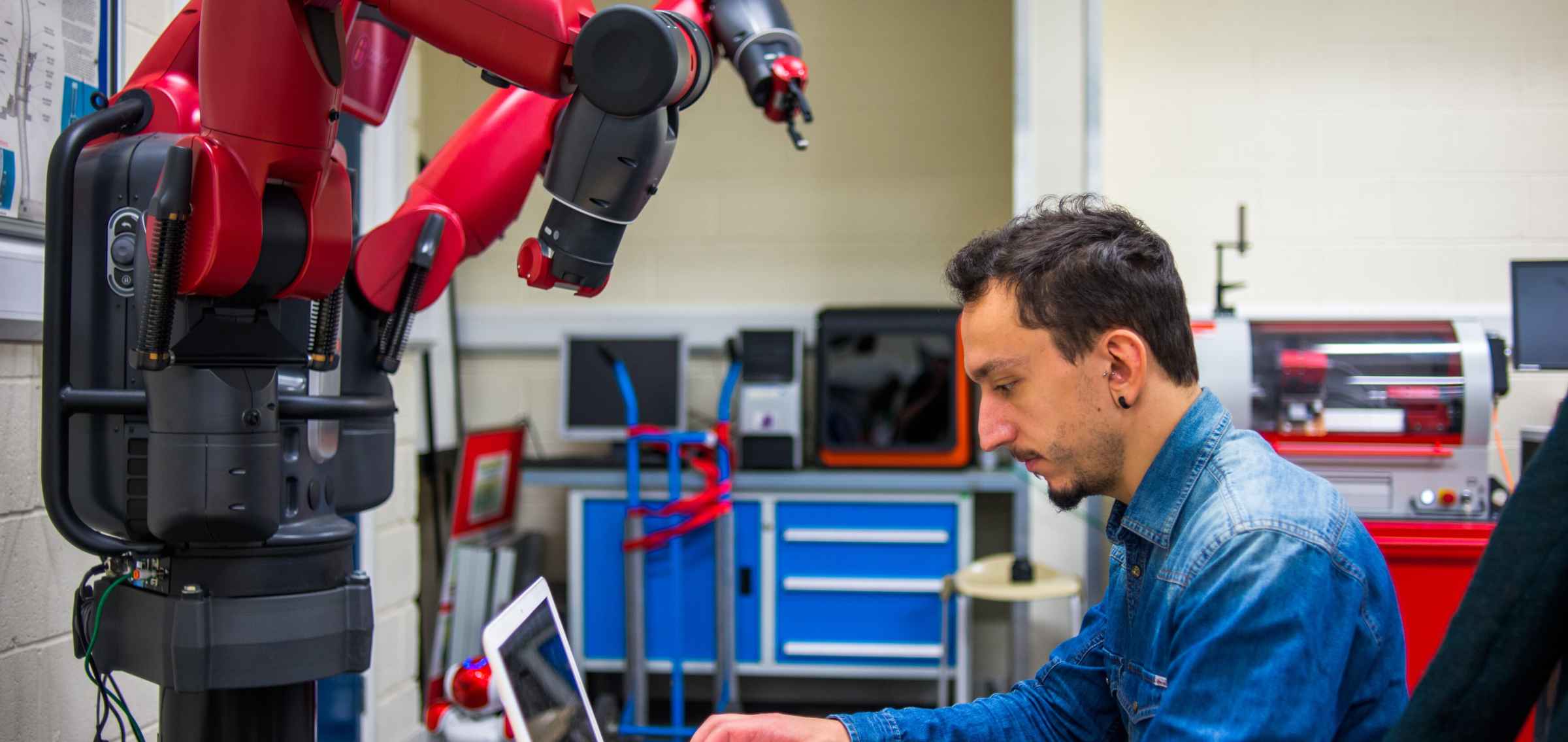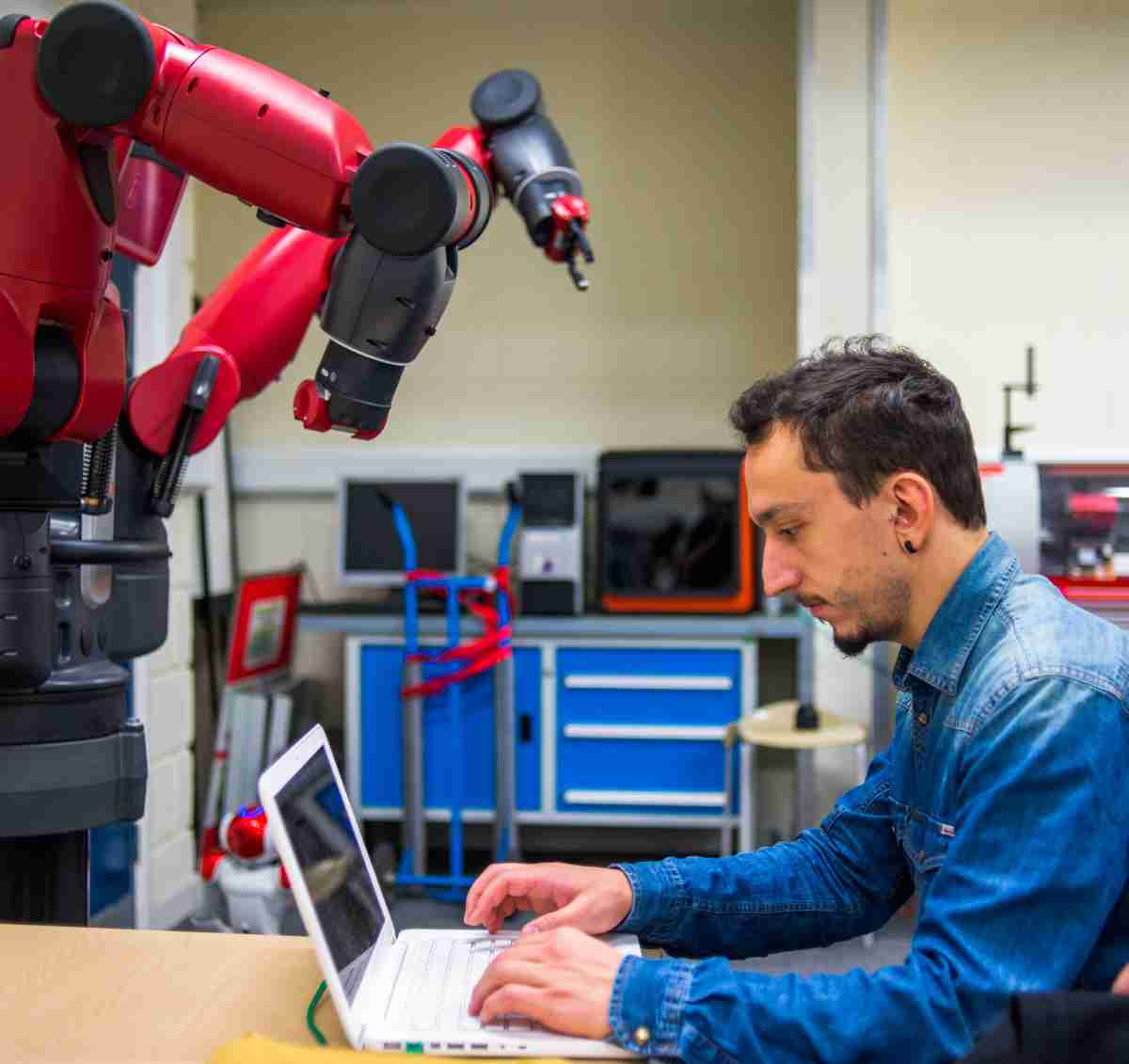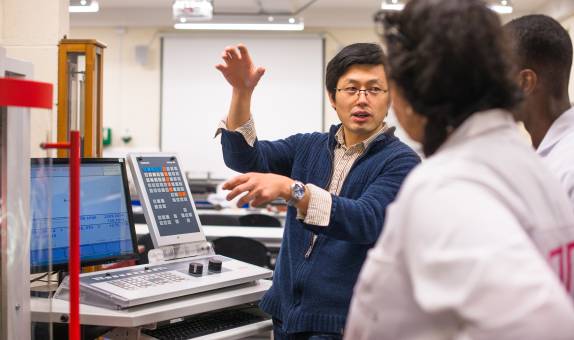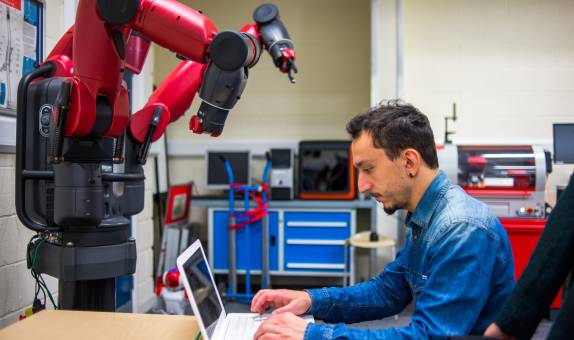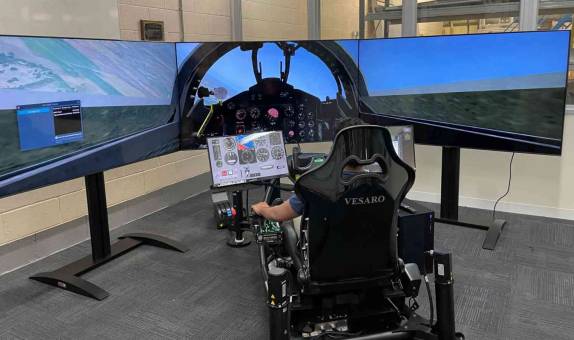Robotic Engineering and Artificial Intelligence MEng/BEng (Hons)
Why choose this course?
Robotic Engineering and Artificial Intelligence stand at the cutting edge of technological progress to address some of the most pressing challenges facing society today, encompassing innovations such as industrial robotic arms, autonomous vehicles, aerial drones and space robots. As a student on this course, you will acquire the vital skills and knowledge required to tackle these intricate challenges, opening up a world of possibilities at the intersection of these two potent fields, and ultimately making a significant impact on a global level.
Our hand-on course equips you with the Future Skills needed to thrive in the rapidly evolving technological landscape. Discover how to harness the power of artificial intelligence and other state-of-the-art technologies to design and develop intelligent systems and contribute to the development of innovative solutions that can make a positive impact on society. The course will prepare you for a career in a wide range of fields and ensure that you are well-positioned to take advantage of the opportunities presented by the Fourth Industrial Revolution.
Embrace the UN Sustainable Development Goals as a guiding force for a sustainable future for all. In this course, you will learn how to integrate these goals into your professional endeavours, actively contributing to their achievement. Our diverse and inclusive curriculum, crafted to meet the needs of varied communities, is delivered by academics from diverse backgrounds. This unique learning experience allows students to engage with people from different cultures and perspectives, enriching their understanding and broadening their horizons.
| Course | Attendance | UCAS code | Year of entry |
|---|---|---|---|
| Robotic Engineering and Artificial Intelligence MEng | 4 years full time | H903 | 2024 (Clearing) 2025 |
| Robotic Engineering and Artificial Intelligence MEng | 5 years full time including sandwich year | H904 | 2024 (Clearing) 2025 |
| Robotic Engineering and Artificial Intelligence BEng (Hons) | 3 years full time | H900 | 2024 (Clearing) 2025 |
| Robotic Engineering and Artificial Intelligence BEng (Hons) | 4 years full time including sandwich year | H901 | 2024 (Clearing) 2025 |
Please note: Teaching on this course may take place on more than one KU campus.
| Main Location | Roehampton Vale |
Reasons to choose Kingston University
- Focus on the core principles of robotic engineering and applied artificial intelligence. This programme is designed to provide you with the skills and knowledge highly valued in the rapidly evolving industrial, commercial, and domestic sectors.
- Solve real-world robotics challenges using artificial intelligence.
- Explore robotics, autonomous systems, artificial intelligence, machine learning, computer vision, and intelligent control systems.
- Work alongside peers from various cultural, social, and professional backgrounds on team-based projects. This collaboration encourages appreciation for diversity, enhances your ability to understand different perspectives, and cultivates an inclusive mindset, which is essential for future engineering professionals.
What you will study
Year 1
Year 2
Year 3
Year 4 (MEng)
Core modules
Navigate for the Professional Engineer
15 credits
On this module you'll be introduced to your course learning aims and consider your anticipated learning targets from induction to graduation. You'll be guided to identify and take ownership of your personal academic journey through the development and application of academic skills aligned to KU Graduate Attributes and their discipline-specific professional body learning outcomes. You'll be tutored in a range of 'learning to learn' techniques, and will be introduced to assessment for learning and the role of feedback, reflection and feedforward as an integrated part of your learning journey. This will be supported through active engagement in the KU Navigate Programme, enabling you to understand and begin to develop a design thinking approach to Future Skills development.
Engineering Mathematics
15 credits
This module will provide you with a thorough background in engineering mathematics and give you the mathematical skills essential for solving engineering problems. The topics introduced will serve as basic tools for studies in many engineering subjects, including algebra, functions, statistics and probability, trigonometry, calculus, differential equations and vectors. You will be empowered to understand and be able to use the language and methods of mathematics in the description, analysis and design of engineering systems. The emphasis is on using mathematical tools to solve engineering problems. The computing software used will typically include MATLAB and Excel.
Introduction to Programming
15 credits
This module will introduce you to scripting in one of the most popular programming languages in industry, which is widely used for data processing, automation of tasks and more recently for machine learning (ML) and artificial intelligence (AI) specifically in the engineering industry. The module will cover all the fundamentals of programming, which will provide you with a valuable transferrable skill set that can provide the essential skills needed for scripting in other computer languages in future modules. It will also provide the crucial foundations for you to investigate applications involving both ML and AI as you progress through the course.
Introduction to Robotics
15 credits
This module provides you with a comprehensive introduction to the field of robotics, including actuators, sensors and manipulators, and how they contribute to the overall functionality of a robot. Through hands-on programming exercises and projects, you'll develop your digital competency and technical skills in robotics. You'll gain practical experience in using programming languages and tools relevant to robotics, fostering an entrepreneurial mindset and preparing you for careers in various industries.
Electromechanical Systems Data
30 credits
This module will provide you with the key aspects involved in planning an electromechanical project from start to finish. You'll design processes that incorporate a sustainability agenda, building an awareness of the interactions across various disciplines, regulatory frameworks and health and safety procedures.
You will be introduced to fundamental electronic components, their application in the design of electromechanical systems, and communication of engineering design ideas through integrating engineering drawing and 3D solid modelling. This module encourages the use of simulation tools for the design and analysis of the systems to enhance analytical as well as employability skills. The module also involves the IMechE Design Challenge as a part of the curriculum, giving you an opportunity to work in a team to produce engineering artefacts that are capable of accomplishing tasks, as well as developing interpersonal skills in order to enhance your employability.
Microcontrollers and Interface Electronics
30 credits
This module is designed to introduce you to both the operation and functionality of microcontrollers and the techniques used to interface them to sensors and transducers, with the aim to monitor and control a closed loop system. Interface circuitry, operation of sensors and actuator control are covered in depth, along with the inclusion of devices to extend the number of analogue and digital port lines on a microcontroller.
Optional modules
Formula Student AI Fundamentals
0 credits
This module is a zero-credit module designed to develop your knowledge through the Formula Student Artificial Intelligence (FS-AI) competition. By exploring essential elements of the competition - autonomous vehicle design, real-world autonomous integration, and autonomous driving missions - this module aims to cultivate your skills in line with industry demands.
Core modules
Numerical Analysis and Computing
15 credits
This module aims to equip you with mathematical skills that are crucial for comprehending engineering subjects effectively. The topics covered in the module will serve as fundamental tools for studying various engineering subjects. You will be empowered to comprehend and utilise the language and techniques of mathematics in describing, analysing, and designing engineering systems. The primary focus is on utilising mathematical tools to resolve engineering problems, especially on mechanical systems, robotics, control systems, and signal processing.
Robot Kinematics and Dynamics
15 credits
The module focuses on kinematics and dynamics, enabling you to map motion from joint to Cartesian space and offering you the tools useful to design model-based control algorithms with superior performance. Topics covered include direct and inverse kinematics, differential kinematics, Lagrangian and Newton-Euler dynamics, dynamic parameter identification, design of model-based (e.g. hybrid, impedance, adaptive) controllers.
Exploring Engineering Project Management
15 credits
This is a core module for all Level 5 students on engineering programmes. You will demonstrate a developing awareness of the skills required to operate as a professional in their subject area. This module will scaffold Future Skills from Level 4 Navigate to Level 6 Apply.
This module considers the principles and practices for the design and management of engineering projects. The nature of engineering project management is discussed in the context of constraints on quality, time, risk, and sustainability. The module broadens the student's knowledge of how organisations undertake and monitor projects.
Control Systems
15 credits
This module is designed to enhance the concepts and apply the fundamental principles of control system engineering to solve real world control engineering problems. It enables you to develop skills to model, interpret and control dynamic behaviour of structures and systems with multi degree of freedom. MATLAB is used to reinforce the concepts learned in the module through simulation. This module is rich in technical content to enhance analytical as well as employability skills.
Machine Learning and Computer Vision
30 credits
This module is designed to equip you with an in-depth understanding of the fundamentals of computer vision and the role machine learning (ML) can play in optimising its functionality. You will gain insight into the principles of computer vision systems and the incorporation of ML into these systems. You will learn how to model and analyse the behaviour of dynamic computer vision systems. You will grasp the concepts of image analysis, pattern recognition and the effects of ML integration in a computer vision system. You will apply computer vision techniques to solve real-world image analysis problems, and you will learn the concepts of ML approaches used in computer vision systems. Python, along with libraries such as OpenCV and TensorFlow, is used to reinforce the concepts learned in the module through software simulations.
Robot Design and Build Project
30 credits
This module provides you with a comprehensive understanding of designing and building robots, with a focus on sensors, actuators, and modeling. You will learn essential concepts and industry-standard software necessary for designing complex robotic systems. Through a project-based assessment approach, you will collaborate in teams to develop technical reports that encompass the design, modeling, cost analysis, and manufacturing details of different robot subsystems. The module emphasises the application of technical drawing standards, British design practices, and design for manufacturing and assembly techniques to enhance students' employability in the engineering sector. Regular project reviews, a design report, and group presentations facilitate the development of innovative ideas and effective teamwork.
Core modules
Applied Business Management
15 credits
You will demonstrate the ability to apply your developing professional skills competencies in your chosen area and will ensure you have a broad understanding of the business environment in which professional activities are undertaken. The module will develop your technical, management and interpersonal skills required to perform in a team environment and prepare you for employment and entrepreneurship.
You will participate in Kingston University's Bright Ideas competition where you will work in a team to develop a business idea of your group's choice. To do this you will need to interact with relevant stakeholders outside the University.
Advanced Microcontrollers
15 credits
This module enables you to identify and develop skills in the solution of problems relating to the creation of mechatronic systems and robotic automation. You will be introduced to the techniques and knowledge required to design and embed microcontrollers, linked to a range of sensors and actuators, into a system to sense, process, control and display real world events, similar to those encountered within an industrial engineering, or commercial environment. The module covers topics such as advanced programming, state-of-the-art sensors and actuators, data logging, microcontroller selection and use of commercial shields (expansion boards) as building blocks to extend system functionality using a modular approach to the design process.
Digital Signal Processing
15 credits
This module provides you with a comprehensive understanding of advanced signal processing techniques and their applications. Through lectures and seminars, you will learn about key concepts such as advanced digital signal analysis, filter design, and implementation, and digital signal processing algorithms. You can expect to gain knowledge in areas like Fourier analysis, spectral estimation, wavelet transforms, and time-frequency analysis. The module covers real-world applications of digital signal processing, such as audio, image and video processing, biomedical signal processing, communication systems, and control systems. You will also engage in practical implementation and simulation exercises, using software tools like MATLAB and Python. In addition to technical skills, the module fosters attributes such as digital competency, adaptability, collaboration, questioning mindset, and resilience.
Modelling and Simulation in Soft Robotics
15 credits
This module covers a comprehensive study of the design principles and computational modelling and simulation techniques for soft robotics which is a rapidly growing field that seeks to create robots that mimic biological organisms in flexibility, adaptability and complex motion. The module introduces you to the key aspects of this exciting field, including principles of soft robotics design, computational modelling and simulation techniques and their applications in biologically inspired designs. At its core, the module emphasises the importance of computational modelling and simulation in soft robotics. As soft robots are often composed of flexible and deformable materials, accurately modelling and simulating their behaviour under various conditions is critical. The module exposes you to a range of computational tools and methods, including finite element analysis and dynamic system simulation and machine learning techniques. You will gain hands-on experience in utilising these tools to model and simulate various aspects of soft robotics, from actuation mechanisms to control strategies.
Applied Robotics and Artificial Intelligence
30 credits
This module is designed to provide you with advanced knowledge and skills in the fields of robotics and artificial intelligence. The module covers a range of topics, including advanced robotics techniques, trajectory planning, planning in joint space with imposed conditions, planning in cartesian space, orientation trajectories, and the integration of computer vision and artificial intelligence in robotics applications. You will gain a deeper understanding of how to design and implement robotic systems that can perform complex tasks efficiently and intelligently. You will also explore current research and industry developments related to the deployment of intelligent robots. This technical as well as research-informed module will enhance your analytical and employability skills. Additionally, it provides you with the opportunity to enhance your research, interpersonal and presentation skills.
Individual Project
30 credits
In this module you will research and study in detail a topic in your chosen field of study which is of personal interest.
You'll be able to show high levels of responsibility and organisational capability (through arranging meetings with supervisors, setting project goals and meeting appropriate deadlines) as well as demonstrate effective communication with others. The module encourages you to recognise, question and deal with the ethical dilemmas that are likely to occur in research and professional practice. You can further enhance the independence and employability skills the industry is looking for in graduates, especially those seeking professional recognition as a chartered engineer.
Core modules
Advanced Electronics and Control for Robotics
30 credits
This module encompasses a range of related fields, such as control, advances electronics and embedded implementation for robotics, introducing classical design and tools for analysis of control systems. Time domain design methods are followed by frequency domain design methods. Although the module mainly deals with continuous-time systems, discrete-time systems are also discussed. Your learning is supported by practical exercises where you'll design and implement embedded control systems using computer-aided design tools and embedded microcontroller-based robotic platforms. In addition to the theoretical concepts, the focus of this module is on implementation, providing you with a set of skills that will enhance your employability.
Aerial Robotics and Unmanned Vehicles
15 credits
This module delves into the kinematic and dynamic models of wheeled and aerial robots, starting with fundamental concepts like nonholonomic constraints for wheeled robotics. You'll learn about dynamic models, path planning, regulation and tracking, artificial potential fields for obstacle avoidance, and control techniques. Aerial robotics introduces different vehicle definitions, along with altitude, attitude, and position control strategies for efficient vehicle manipulation. The significance of visual servoing techniques in aerial robotics is also highlighted. Throughout the module, you'll engage in practical exercises, simulations and hands-on projects to reinforce your theoretical knowledge. You will be equipped with the skills necessary to design and implement control systems for unmanned vehicles, enabling you to contribute to the advancement of autonomous robotics in various industries.
Applied Deep Learning
15 credits
This module is designed to expand your knowledge and skills in the fields of artificial intelligence, in particular, deep learning applied to robotic applications. The module covers a range of topics, including Convolutional Neural Networks (CNNs), Deep Reinforcement Learning (DRL) and Recurrent Neural Networks (RNNs). You will gain a deeper understanding of how to design and implement robotic systems that can perform complex tasks efficiently and intelligently such as responding to human behaviour and navigating autonomously in complex and dynamic environments.
Biologically Inspired Robotics
15 credits
This module explores the synergy between robotics and bio-inspired design, deriving design principles from living systems to enhance understanding in key areas such as mechatronic systems and sensor/actuator technologies. You will engage with a comprehensive learning journey encompassing lectures, tutorials and hands-on lab exercises. These formats will facilitate a deep understanding of the adaptability and autonomy present in animal life, and how these principles can be applied to robotics. The module offers you a valuable opportunity to develop and showcase your innovative prowess in the creation, construction and critical assessment of new robotic applications. The focus is on surpassing existing designs in adaptability, manoeuvrability, resilience and energy efficiency. You can expect to bolster your problem-solving abilities as you deal with complex design challenges. You will also develop critical thinking skills as you evaluate the feasibility and efficiency of their designs. Communication skills will be honed during a team-based project and presentation.
Human-Robot Interaction
15 credits
This module provides you with the knowledge of the basic principles of human-robot interaction (HRI), exploring the fundamentals of a new area of research related to robotics, focusing on the physical, cognitive, and social interaction between humans and robots. This module aims to provide you with a comprehensive understanding of HRI principles, theories, and practical applications. You will learn to design, evaluate, and implement effective HRI systems that enable seamless communication and collaboration between humans and robots.
MEng Team Project
30 credits
The MEng Team Project is a module which runs throughout the final year of the MEng programme. It provides a capstone element to the course by providing an opportunity for you to work on a major engineering design problem in a team in a way which closely parallels a real-world project. The groups are assigned to a particular project which has an outline project description, specification, or customer requirements provided by the teaching team. It is your group's job to develop the specification in detail, to convert it to a technical specification and then carry out the tasks necessary to complete the project. This module provides an opportunity for you to further develop academic skills delivered earlier in the programme. In order to successfully complete the module, you must establish a plan and work schedule, perform the technical tasks necessary to fulfil the plan, monitor progress, manage the team activities, hold and minute formal team design meetings, and resolve any problems that arise.
Foundation year
An Engineering Foundation course with pathways in Mechanical Engineering is available.
Mechanical Engineering at Kingston
Future Skills
Knowledge to give you the edge
Embedded within every course curriculum and throughout the whole Kingston experience, Future Skills will play a role in shaping you to become a future-proof graduate, providing you with the skills most valued by employers such as problem-solving, digital competency, and adaptability.
As you progress through your degree, you'll learn to navigate, explore and apply these graduate skills, learning to demonstrate and articulate to employers how future skills give you the edge.
At Kingston University, we're not just keeping up with change, we're creating it.

Entry requirements
If you would like to join us through Clearing 2024, please call our Clearing line on 0800 0483 334 (or +44 020 8328 1149 if you are calling from outside the UK) and speak to our friendly and knowledgeable hotliners who will be able to provide information on available courses and will guide you through your options.
Please note the entry requirements listed below are for 2025 entry only.
Teaching and assessment
Scheduled learning and teaching on this course includes timetabled activities including lectures, seminars and small group tutorials.
It may also include placements, project work, workshops, workshops in computer labs, and laboratory workshops.
Who teaches this course
The course team comprises highly-experienced staff members with extensive knowledge in both research and industry. Our dedicated academic staff continue to actively engage in cutting-edge research and maintain strong connections within their respective disciplines, ensuring that the curriculum remains up-to-date, relevant, and informed by the latest industry developments.
As a student on our programme, you will have the opportunity to learn from these world-class academics, benefiting from their wealth of experience and expertise. Our supportive community, which includes not only our accomplished academics but also skilled technicians and attentive administrative staff, is fully committed to helping you succeed in your educational journey. Our diverse staff and student body bring unique insights and experiences, enabling you to learn from different perspectives and broaden your understanding of the global engineering landscape.
Facilities
There is a wide range of facilities for practical work at our Roehampton Vale campus, where this course is based.
Our applied approach to teaching is supported by dedicated laboratories, including state-of-the-art facilities for rapid prototyping and manufacturing, a fully equipped materials laboratory, and a modern electronics and robotics lab. Our labs have recently been enhanced with the addition of robot and electronic equipment, providing students with access to the latest technologies and tools.
You will have access to a modern environment with the latest technology and industry-standard equipment, including:
- electronics and robotics labs
- 3D design studio and workshop
- mechanical engineering workshop
- rolling roads
- automotive testing facilities
- a Lotus Exige
- cars and motorcycles built by engineering students.
The recently enlarged library at Roehampton Vale provides collections of specialist engineering books and journals.
The £4 million Hawker Wing provides three floors of extra space for students and staff at Roehampton Vale, including improved learning and teaching facilities.
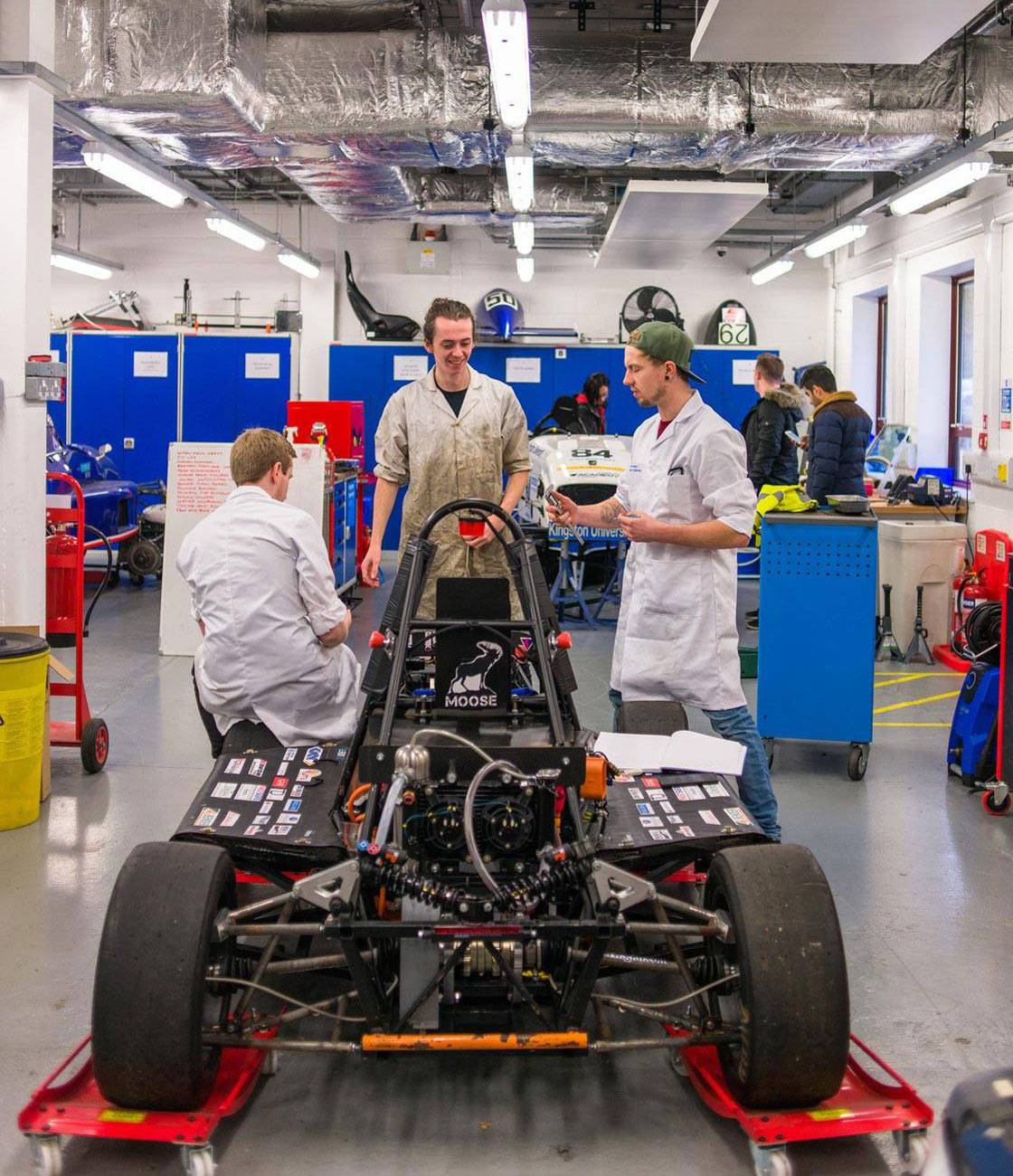
Course fees and funding
Additional costs
Depending on the programme of study, there may be extra costs that are not covered by tuition fees which students will need to consider when planning their studies. Tuition fees cover the cost of your teaching, assessment and operating University facilities such as the library, access to shared IT equipment and other support services. Accommodation and living costs are not included in our fees.
Where a course has additional expenses, we make every effort to highlight them. These may include optional field trips, materials (e.g. art, design, engineering), security checks such as DBS, uniforms, specialist clothing or professional memberships.
After you graduate
You'll graduate ready for a successful career in industry, having gained hands-on experience, practical, professional and technical skills.
Work placement year
How you can work in industry during your course
Why take a placement? Work placements have many benefits:
- Providing work experience that is relevant to your course and future career
- Improving your chances of graduating with a higher grade degree
- Enhancing your CV
- Can lead to a graduate job
- Can enable you to earn a year's salary whilst studying (the vast majority of placements are paid)
-
Can help you select your final-year project.
"To be successful, tomorrow's leaders will need to be far more rounded individuals than ever before. They will collaborate in pursuit of shared goals. They will guide, challenge and support...They will have an appetite for change and a hunger for continuous improvement, and they will have an ethos of learning and development..."
Jeremy Darroch, Former Chief Executive, Sky
"Doing a placement year effectively gives you one foot in the door of a future job and to stand out from the crowd... as well as enhancing my CV... and future interviews. It's a great motivator to be successful in my studies as it only serves to open even more doors and gain more skills."
Placement student at Jagex Games Studios Ltd
- 81% of placement students and 34% of non-placement students got a first or 2.1 (Faculty of Computing, Information Systems and Mathematics, 2008).
- 100% of placement students during 2008 recommend doing a placement (Faculty of Computing, Information Systems and Mathematics, 2008).
-
Many employers offer a graduate job to their successful placement students.
There is a lot of support available for students looking to secure a placement (e.g. a jobs board with placement vacancies, help with writing CVs and mock interviews). Getting a placement and passing the placement year are ultimately the student's responsibility.
For further information please contact the Placements Team by telephone 020 8417 2969 or email secplace@kingston.ac.uk.
Examples of placements
Placements can be with large multinational companies, international companies, local companies and small start-ups; offering a diverse range of posts. Here are some examples of employers and roles:
|
Construction-based placement employers |
Construction-based placement roles |
|---|---|
|
RG Group |
Assistant site manager |
|
Science-based placement employers |
Science-based placement roles |
|
Reckitt and Benckiser |
Bioanalytical sciences |
|
Engineering-based placement employers |
Engineering-based placement roles |
|
Airbus |
Analysis of aircraft structure |
|
Computing and IS based placement employers |
Computing and IS based placement roles |
|
Disney |
Database co-ordinator |
|
Mathematics-based placement employers |
Mathematics-based placement roles |
|
Lloyds Banking Group |
Analyst |
Course changes and regulations
The information on this page reflects the currently intended course structure and module details. To improve your student experience and the quality of your degree, we may review and change the material information of this course. Course changes explained.
Programme Specifications for the course are published ahead of each academic year.
Regulations governing this course can be found on our website.
